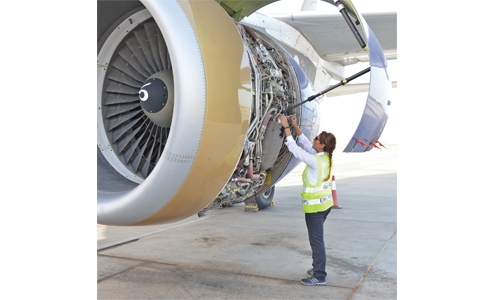How it all began
With the initiative of Her Royal Highness Princess Sabeeka bint Ibrahim Al Khalifa, wife of His Majesty the King, President of the Supreme Council for Women, this year’s Bahraini Women’s Day has been dedicated to celebrating the success of women in the field of engineering and to highlight how Bahraini women started to leave their fingerprint on this sector since it was initiated in 1977. However, a peep into how it all began will be interesting. On February 14, 2017, Her Royal Highness announced a plan of action for the Supreme Council for Women to achieve the objectives of the celebration of women in the engineering sector. This announcement marked the launching of a series of events related to Bahraini Women’s Day this year, including cultural activities, focus groups, workshops and forums that targeted women in various locations.
Women in engineering
The theme of Bahrain Women’s Day 2017, which was dedicated to the celebration of women in the engineering field, came in the form of overlapping geometric shapes that reflect Bahraini women’s participation in the engineering fabric of the Kingdom of Bahrain. The overall shape of the Bahraini women’s Day in the engineering field is inspired by the constant slogan of Bahraini Women’s Day
A bit of history
Bahraini women entered the engineering sector in the 1970s, when studying engineering as a specialization was initiated until the present, an area where women continued to excel in.
Industrial education began in the Kingdom of Bahrain in 1936 to meet the need for skilled technical workers and to fill the gap with the electricity departments (Bapco and Bahrain Petroleum Company), followed by the opening of many industrial schools for boys, and in 1968 the Gulf Industrial College, The Gulf College of Technology, to serve as a regional college serving graduates of industrial high schools in the Gulf region, with the aim of graduating technologists at a distinct technical level in industrial disciplines in particular, and in 1975 the Civil Engineering and Construction Department and the Mechanical Engineering Department. This opened the way for Bahraini women to join the engineering majors in the higher education institutions in the Kingdom of Bahrain. Bahraini women engineers are present in all sectors of development, and in a number of leadership positions in Government organisations and large private companies. They have reached the posts of undersecretaries, assistant undersecretaries, directors, chief executive officers and vice presidents.
Main objectives
• Documenting the work of women in the engineering field with all its qualitative branches and highlighting success stories.
• Examine ways to address the challenges faced by Bahraini women working in the engineering field by completing and activating policies to integrate women’s needs and ensure their sustainability in the engineering sector.
•Raising graduates’ awareness of the available promising jobs in the field of engineering work.
• To improve and develop the services provided by the concerned institutions in the engineering sector to Bahraini women to ensure that their needs are integrated and equal opportunities achieved.
Supervisory panel
Based on the directives of Her Royal Highness Princess Sabeeka bint Ibrahim Al Khalifa, upon receiving His Excellency Shaikh Khalid bin Abdullah Al Khalifa, Deputy Prime Minister and a number of ministers and officials concerned with the engineering affairs and members of the Supreme Council for Women and a number of women leaders in the field of engineering, academic institutions and civil society institutions concerned, the Supreme Supervisory Committee for Bahrain Women’s Day was formed and executive committees for the public sector, the private sector and civil society organizations were then formed to follow up the implementation of the general plan for the Bahraini women’s day 2017.
Leading positions held by Bahraini women engineers
2005: Assistant Undersecretary for Technical Services at the Ministry of Works
2007: Deputy CEO for Production and Transmission of Electricity and Water
2011: Assistant Undersecretary for Roads, Ministry of Works, Municipal Affairs and Urban Planning
2013: Undersecretary for Land Transport and Post at the Ministry of Transportations and Communications
2013: Assistant Undersecretary for Construction and Maintenance Projects at the Ministry of Works, Municipal Affairs and Urban Planning
2014: Assistant Secretary-General of the Tender and Auction Board with the rank of Assistant Undersecretary
Assistant Undersecretary for Sewerage at the Ministry of Works, Municipal Affairs and Urban Planning
2016: Deputy CEO of Electricity and Water Authority
Related Posts

